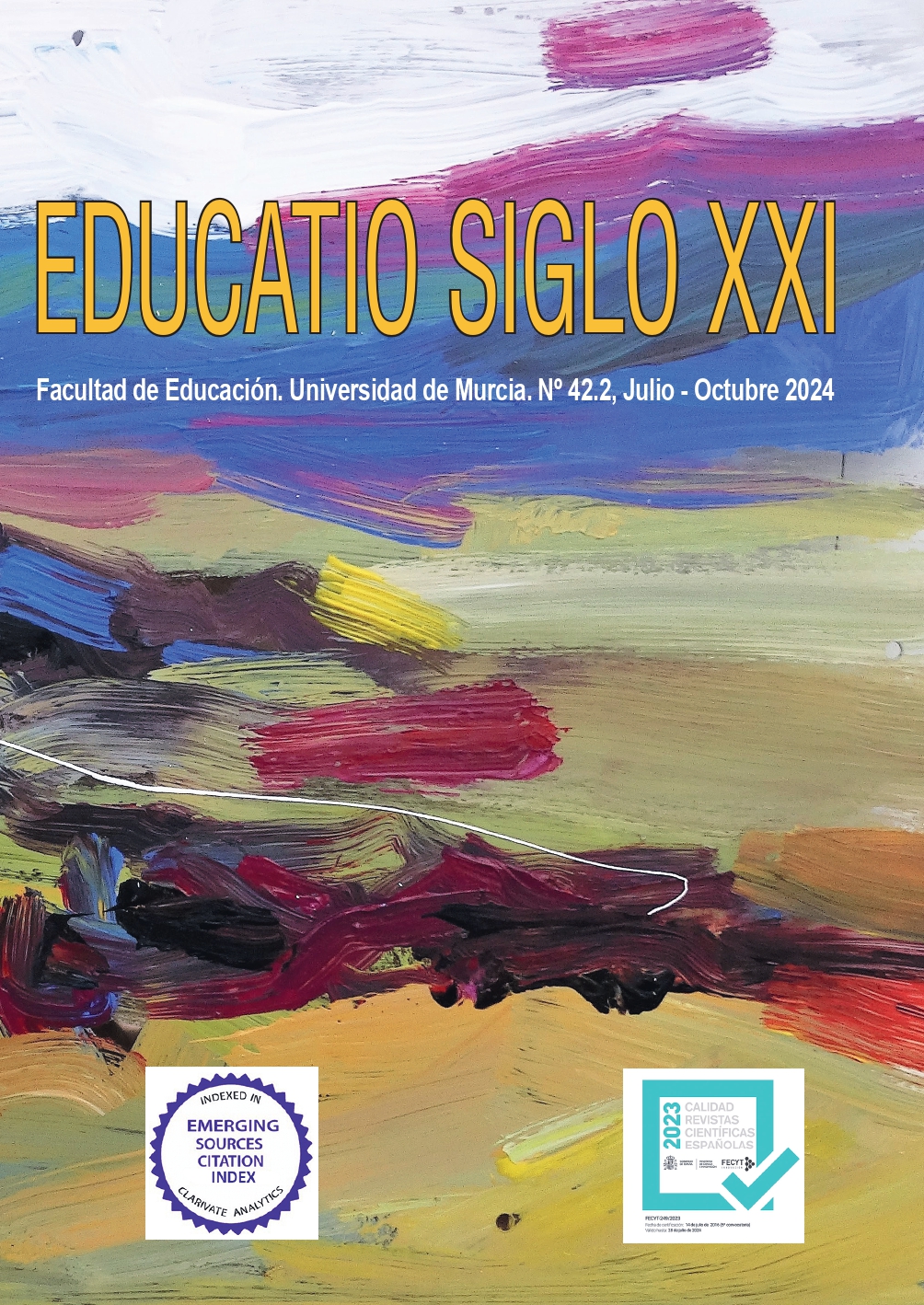On the meaning of practical training in early childhood education
Abstract
In the introduction of the study, reference is made to the internships in the early childhood education degree and the value and meaning of these internships for students is also explained. During the third and fourth years, future teachers go to the classroom and experience formative knowledge that moves away from exclusively theoretical stances. They learn in situations, in specific realities together with early childhood education professionals. Therefore, for this study we opted for a qualitative methodology and shared the voice of all the trainees involved in the internship. A questionnaire validated by university lecturers was used, which was administered using technological resources to make participation more flexible. The results are organized around nine centers of interest that coincide with thematic cores (waiting, fears, experience, diversity, the future, usefulness, internships - in two parts - and the future). The discussion provides answers to the various research questions posed, according to the meaning acquired by the experience and its
practical usefulness. Besides, it should be noted that considerations such as the fact that internships are fundamental to their training, development and vocation are emphasized.
Downloads
-
Abstract450
-
PDF (Español (España))329
References
Amar, V. (2018). Déjame que mire un cuento: narración, familia y educación infantil. Una investigación narrativa. Profesorado. Revista de Currículum y Formación de Profesorado, 22(2), 389-405. http://hdl.handle.net/10481/53124
Amar, V. (2019). La experiencia del prácticum I en educación infantil. Una narración en primera persona. Revista Practicum, 4(2), 60-76. https://doi.org/10.24310/RevPracticumrep.v4i2.7804
Ayala-Carabajo, R. (2017). Retorno a lo esencial. Fenomenología hermeneútica Aplicada desde el enfoque de van Manen. Caligrama
BERA (Asociación Británica de Investigación Educativa) (2019). Guía Ética para la Investigación Educativa. https://www.bera.ac.uk/publication/guia-etica-para-la-investigacion-educativa
Clavijo, J. y Trujillo, C. (2022). Actividades experimentales para educación infantil. En D. Madrid y M. Pascual (Coords.). Buenas prácticas en la Educación Infantil (280-287). Dykinson.
Fernández, J. (2015). Atención a la diversidad en el aula de educación infantil. Paraninfo.
Gairín, J., Díaz, A. Del Arco, I. y Flores, O. (2019). Efecto e impacto de las prácticas curriculares de los Grados de Educación Infantil y Primaria: la perspectiva de estudiantes, tutores y coordinadores. Educación XX1. 22(2), 17-43. https://doi.org/10.5944/educXX1.21311García
Giroux, H. (1990). Los profesores como intelectuales: hacia una pedagogía critica del aprendizaje. Paidós.
Lamb, P. y Aldous, D. (2016). Exploring the relationship between reflexivity and reflective practice through lesson study within initial teacher education. International Journal for Lesson and Learning Studies, 5(2), 99-115. Doi: 10.1108/IJLLS-11-2
Lizana A. y Burgos, A. (2022). El estudio de la práctica reflexiva y la labor tutorial en el proceso de formación docente. Revista electrónica interuniversitaria de formación del profesorado, 25(2), 93-112. https://doi.org/10.6018/reifop.515491
Mérida, R.; González, M; Olivares, M.; Rodríguez, J. y Muñoz, M. (2020). El Prácticum, un espacio para la investigación transformadora en los contextos educativos infantiles. REICE: Revista Iberoamericana sobre Calidad, Eficacia y Cambio en Educación, 18(2), 17-34. https://doi.org/10.15366/reice2020.18.2.001
Misischia, B. S. (2020). Formación y Narrativa. Núcleos de sentido a partir del recorrido autobiográfico.Márgenes, Revista de Educación de la Universidad de Málaga, 1(3), 63-77. DOI: https://doi.org/10.24310/mgnmar.v%vi%i.8355
Muñoz, P.; Raposo, M.; González, M.; Martínez, M.; Zabalza, M. y Pérez, A. (2013). Un Practicum para la formación integral de los estudiantes. Universidad de Santiago de Compostela.
Romero, R., Martínez, S. y Martínez, R. (2023). Experiencias tecnológicas de estudiantes en el Pácticum II de Educación Infantil. Revista Practicum, 8(1), 53-68. https://doi.org/10.24310/RevPracticumrep.v8i1.16809
Roth, W.y Unger, H. (2018). Current Perspectives on Research Ethics in Qualitative Research. Forum: Qualitative Social Research, 19(3). http://dx.doi.org/10.17169/fqs-19.3.3155
Sanmamed, M.; Quintela, N.; Puente, L. y Machado, E. (2022). Calidad de la educación en el grado en educación infantil: desarrollo competencial. Revista INFAD de Psicología. International Journal of Developmental and Educational Psychology, 1(1), 317-326. https://doi.org/10.17060/ijodaep.2022.n1.v1.2381
Tójar, J. y Serrano, J. (2000). Ética e investigación educativa. Revista Electrónica de Investigación y Evaluación Educativa, 6(2), 1-6.
Vara, A. (2016). La concepción de la Educación Infantil en España y su influencia en la formación de su profesorado. RELAdEI. Revista Latinoamericana de Educación Infantil, 5(4), 106-118. https://revistas.usc.gal/index.php/reladei/article/view/4957
Verger, S.; Riera-Negre, L.; Rosselló, M. y Mut, B. (2023). Análisis del Prácticum de Educación Infantil y Primaria en las universidades españolas. Aula Abierta, 52(1), 81–90. https://doi.org/10.17811/rifie.52.1.2023.81-90
Vivar, D. (2022). Buenas prácticas en la educación infantil. Dykinson.
Copyright (c) 2024 Servicio de Publicaciones de la Universidad de Murcia

This work is licensed under a Creative Commons Attribution-NonCommercial-NoDerivatives 4.0 International License.
Original work publishes in this journal is subject to the following terms:
1. Murcia University Press (the publishing house) holds the copyright of the publishes work, and favours and allows their reutilization under the use license stated in point 2.
© Servicio de Publicaciones, Universidad de Murcia, 2015
2. Work is published in the electronic edition under a license (Creative Commons Reconocimiento-NoComercial-SinObraDerivada 4.0 España (legal text). They can be copied, used, disseminated, transmitted and publicly presented, as long as: i) authorship and original publication source is acknowledged (journal, publishing house and URL of the work); ii) are not used for commercial purposes; iii) the existence and specifications of this use license is stated.
3. Conditions for self-archive. Authors are allowed and encouraged to disseminate electronically the pre-pint (before review) and/or post-print (accepted for publication) versions of their work before their publication since that favours earlier circulation and dissemination resulting in an increased chance for the authors to be cited and for the work to reach a bigger share of the academic community. Colour: RoMEO: green.







